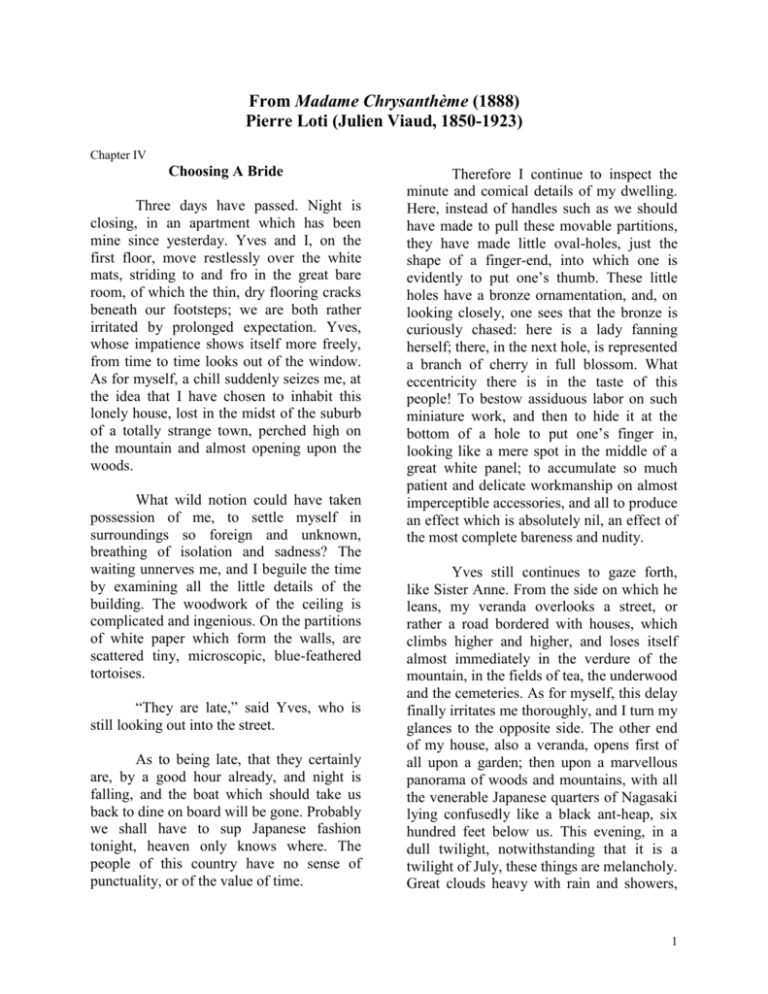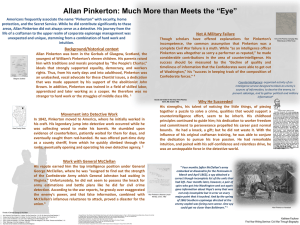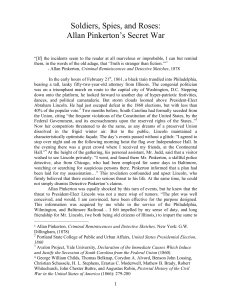Madame Chrysanthemum
advertisement

From Madame Chrysanthème (1888) Pierre Loti (Julien Viaud, 1850-1923) Chapter IV Choosing A Bride Three days have passed. Night is closing, in an apartment which has been mine since yesterday. Yves and I, on the first floor, move restlessly over the white mats, striding to and fro in the great bare room, of which the thin, dry flooring cracks beneath our footsteps; we are both rather irritated by prolonged expectation. Yves, whose impatience shows itself more freely, from time to time looks out of the window. As for myself, a chill suddenly seizes me, at the idea that I have chosen to inhabit this lonely house, lost in the midst of the suburb of a totally strange town, perched high on the mountain and almost opening upon the woods. What wild notion could have taken possession of me, to settle myself in surroundings so foreign and unknown, breathing of isolation and sadness? The waiting unnerves me, and I beguile the time by examining all the little details of the building. The woodwork of the ceiling is complicated and ingenious. On the partitions of white paper which form the walls, are scattered tiny, microscopic, blue-feathered tortoises. “They are late,” said Yves, who is still looking out into the street. As to being late, that they certainly are, by a good hour already, and night is falling, and the boat which should take us back to dine on board will be gone. Probably we shall have to sup Japanese fashion tonight, heaven only knows where. The people of this country have no sense of punctuality, or of the value of time. Therefore I continue to inspect the minute and comical details of my dwelling. Here, instead of handles such as we should have made to pull these movable partitions, they have made little oval-holes, just the shape of a finger-end, into which one is evidently to put one’s thumb. These little holes have a bronze ornamentation, and, on looking closely, one sees that the bronze is curiously chased: here is a lady fanning herself; there, in the next hole, is represented a branch of cherry in full blossom. What eccentricity there is in the taste of this people! To bestow assiduous labor on such miniature work, and then to hide it at the bottom of a hole to put one’s finger in, looking like a mere spot in the middle of a great white panel; to accumulate so much patient and delicate workmanship on almost imperceptible accessories, and all to produce an effect which is absolutely nil, an effect of the most complete bareness and nudity. Yves still continues to gaze forth, like Sister Anne. From the side on which he leans, my veranda overlooks a street, or rather a road bordered with houses, which climbs higher and higher, and loses itself almost immediately in the verdure of the mountain, in the fields of tea, the underwood and the cemeteries. As for myself, this delay finally irritates me thoroughly, and I turn my glances to the opposite side. The other end of my house, also a veranda, opens first of all upon a garden; then upon a marvellous panorama of woods and mountains, with all the venerable Japanese quarters of Nagasaki lying confusedly like a black ant-heap, six hundred feet below us. This evening, in a dull twilight, notwithstanding that it is a twilight of July, these things are melancholy. Great clouds heavy with rain and showers, 1 ready to fall, are travelling across the sky. No, I can not feel at home in this strange dwelling I have chosen; I feel sensations of extreme solitude and strangeness; the mere prospect of passing the night in it gives me a shudder of horror. “Ah! at last, brother,” said Yves, “I believe—yes, I really believe she is coming at last.” I look over his shoulder, and I see a back view of a little doll, the finishing touches to whose toilette are being put in the solitary street; a last maternal glance is given the enormous bows of the sash, the folds at the waist. Her dress is of pearl-gray silk, her obi (sash) of mauve satin; a sprig of silver flowers trembles in her black hair; a parting ray of sunlight touches the little figure; five or six persons accompany her. Yes! it is undoubtedly Mademoiselle Jasmin; they are bringing me my fiancee! best we can, fully conscious of our inferiority in this particular style. Then come persons of intermediate age—then quite young ones, a dozen at least, friends, neighbors, the whole quarter, in fact. And the entire company, on arriving, becomes confusedly engaged in reciprocal salutations: I salute you—you salute me—I salute you again, and you return it—and I re-salute you again, and I express that I shall never, never be able to return it according to your high merit—and I bang my forehead against the ground, and you stick your nose between the planks of the flooring, and there they are, on all fours one before another; it is a polite dispute, all eager to yield precedence as to sitting down, or passing first, and compliments without end are murmured in low tones, with faces against the floor. I rush to the ground floor, inhabited by old Madame Prune, my landlady, and her aged husband; they are absorbed in prayer before the altar of their ancestors. They seat themselves at last, smiling, in a ceremonious circle; we two remaining standing, our eyes fixed on the staircase. And at length emerges the little aigrette of silver flowers, the ebony coiffure, the gray silk robe and mauve sash of Mademoiselle Jasmin, my fiancee! “Here they are, Madame Prune,” I cry in Japanese; “here they are! Bring at once the tea, the lamp, the embers, the little pipes for the ladies, the little bamboo pots! Bring up, as quickly as possible, all the accessories for my reception!” Heavens! why, I know her already! Long before setting foot in Japan, I had met her, on every fan, on every teacup with her silly air, her puffy little face, her tiny eyes, mere gimlet-holes above those expanses of impossible pink and white cheeks. I hear the front door open, and hasten upstairs again. Wooden clogs are deposited on the floor, the staircase creaks gently under little bare feet. Yves and I look at each other, with a longing to laugh. She is young, that is all I can say in her favor; she is even so young that I should almost scruple to accept her. The wish to laugh leaves me suddenly, and instead, a profound chill seizes my heart. What! share even an hour of my life with that little doll? Never! An old lady enters—two old ladies— three old ladies, emerging from the doorway one after another with jerking and mechanical salutations, which we return as The next question is, how to get rid of her. 2 She advances smiling, with an air of repressed triumph, and behind her looms M. Kangourou, in his suit of gray tweed. Fresh salutes, and behold her on all fours, she too, before my landlady and before my neighbors. Yves, the big Yves, who is not about to be married, stands behind me, with a comical grimace, hardly repressing his laughter—while to give myself time to collect my ideas, I offer tea in little cups, little spittoons, and embers to the company. Nevertheless, my discomfited air does not escape my visitors. M. Kangourou anxiously inquires: “How do you like her?” And I reply in a low voice, but with great resolution: “Not at all! I won’t have that one. Never!” and good-natured simplicity. They are only doing a thing that is perfectly admissible in their world, and really it all resembles, more than I could have thought possible, a bona fide marriage. “But what fault do you find with the little girl?” asks M. Kangourou, in consternation. I endeavor to present the matter in the most flattering light: “She is very young,” I say; “and then she is too white, too much like our own women. I wished for one with an ivory skin, just as a change.” “But that is only the paint they have put on her, Monsieur! Beneath it, I assure you, she is of an ivory hue.” Yves leans toward me and whispers: I believe that this remark was almost understood in the circle around me. Consternation was depicted on every face, jaws dropped, and pipes went out. And now I address my reproaches to Kangourou: “Why have you brought her to me in such pomp, before friends and neighbors of both sexes, instead of showing her to me discreetly, as if by chance, as I had wished? What an affront you will compel me now to put upon all these polite persons!” The old ladies (the mamma, no doubt, and aunts), prick up their ears, and M. Kangourou translates to them, softening as much as possible, my heartrending decision. I feel really almost sorry for them; the fact is, that for women who, not to put too fine a point upon it, have come to sell a child, they have an air I was not prepared for: I can hardly say an air of respectability (a word in use with us which is absolutely without meaning in Japan), but an air of unconscious “Look over there, brother, in that corner by the last panel; have you noticed the one who is sitting down?” Not I. In my annoyance I had not observed her; she had her back to the light, was dressed in dark colors, and sat in the careless attitude of one who keeps in the background. The fact is, this one pleased me much better. Eyes with long lashes, rather narrow, but which would have been called good in any country in the world; with almost an expression, almost a thought. A coppery tint on her rounded cheeks; a straight nose; slightly thick lips, but well modelled and with pretty corners. A little older than Mademoiselle Jasmin, about eighteen years of age perhaps, already more of a woman. She wore an expression of ennui, also of a little contempt, as if she regretted her attendance at a spectacle which dragged so much, and was so little amusing. 3 “Monsieur Kangourou, who is that young lady over there, in dark blue?” “Over there, Monsieur? She is called Mademoiselle Chrysantheme. She came with the others you see here; she is only here as a spectator. She pleases you?” said he, with eager suddenness, espying a way out of his difficulty. Then, forgetting all his politeness, all his ceremoniousness, all his Japanesery, he takes her by the hand, forces her to rise, to stand in the dying daylight, to let herself be seen. And she, who has followed our eyes and begins to guess what is on foot, lowers her head in confusion, with a more decided but more charming pout, and tries to step back, half-sulky, halfsmiling. “It makes no difference,” continues M. Kangourou, “it can be arranged just as well with this one; she is not married either, Monsieur!” She is not married! Then why didn’t the idiot propose her to me at once instead of the other, for whom I have a feeling of the greatest pity, poor little soul, with her pearl-gray dress, her sprig of flowers, her now sad and mortified expression, and her eyes which twinkle like those of a child about to cry. “It can be arranged, Monsieur!” repeats Kangourou again, who at this moment appears to me a go-between of the lowest type, a rascal of the meanest kind. Only, he adds, we, Yves and I, are in the way during the negotiations. And, while Mademoiselle Chrysantheme remains with her eyelids lowered, as befits the occasion, while the various families, on whose countenances may be read every degree of astonishment, every phase of expectation, remain seated in a circle on my white mats, he sends us two into the veranda, and we gaze down into the depths below us, upon a misty and vague Nagasaki, a Nagasaki melting into a blue haze of darkness. Then ensue long discourses in Japanese, arguments without end. M. Kangourou, who is laundryman and low scamp in French only, has returned for these discussions to the long formulas of his country. From time to time I express impatience, I ask this worthy creature, whom I am less and less able to consider in a serious light: “Come now, tell us frankly, Kangourou, are we any nearer coming to some arrangement? Is all this ever going to end?” “In a moment, Monsieur, in a moment;” and he resumes his air of political economist seriously debating social problems. Well, one must submit to the slowness of this people. And, while the darkness falls like a veil over the Japanese town, I have leisure to reflect, with as much melancholy as I please, upon the bargain that is being concluded behind me. Night has closed in; it has been necessary to light the lamps. It is ten o’clock when all is finally settled, and M. Kangourou comes to tell me: “All is arranged, Monsieur: her parents will give her up for twenty dollars a month—the same price as Mademoiselle Jasmin.” On hearing this, I am possessed suddenly with extreme vexation that I 4 should have made up my mind so quickly to link myself in ever so fleeting and transient a manner with this little creature, and dwell with her in this isolated house. We return to the room; she is the centre of the circle and seated; and they have placed the aigrette of flowers in her hair. There is actually some expression in her glance, and I am almost persuaded that she—this one—thinks. Yves is astonished at her modest attitude, at her little timid airs of a young girl on the verge of matrimony; he had imagined nothing like it in such a connection as this, nor I either, I must confess. “She is really very pretty, brother,” said he; “very pretty, take my word for it!” These good folks, their customs, this scene, strike him dumb with astonishment; he can not get over it, and remains in a maze. “Oh! this is too much,” he says, and the idea of writing a long letter to his wife at Toulven, describing it all, diverts him greatly. Chrysantheme and I join hands. Yves, too, advances and touches the dainty little paw. After all, if I wed her, it is chiefly his fault; I never should have remarked her without his observation that she was pretty. Who can tell how this strange arrangement will turn out? Is it a woman or a doll? Well, time will show. The families, having lighted their many-colored lanterns swinging at the ends of slight sticks, prepare to retire with many compliments, bows, and curtseys. When it is a question of descending the stairs, no one is willing to go first, and at a given moment, the whole party are again on all fours, motionless and murmuring polite phrases in undertones. “Haul back there!” said Yves, laughing, and employing a nautical term used when there is a stoppage of any kind. At length they all melt away, descending the stairs with a last buzzing accompaniment of civilities and polite phrases finished from one step to another in voices which gradually die away. He and I remain alone in the unfriendly, empty apartment, where the mats are still littered with the little cups of tea, the absurd little pipes, and the miniature trays. “Let us watch them go away!” said Yves, leaning out. At the door of the garden is a renewal of the same salutations and curtseys, and then the two groups of women separate, their bedaubed paper lanterns fade away trembling in the distance, balanced at the extremity of flexible canes which they hold in their fingertips as one would hold a fishing-rod in the dark to catch night-birds. The procession of the unfortunate Mademoiselle Jasmin mounts upward toward the mountain, while that of Mademoiselle Chrysantheme winds downward by a narrow old street, halfstairway, half-goat-path, which leads to the town. Then we also depart. The night is fresh, silent, exquisite, the eternal song of the cicalas fills the air. We can still see the red lanterns of my new family, dwindling away in the distance, as they descend and gradually become lost in that yawning abyss, at the bottom of which lies Nagasaki. Our way, too, lies downward, but on an opposite slope by steep paths leading to the sea. 5 And when I find myself once more on board, when the scene enacted on the hill above recurs to my mind, it seems to me that my betrothal is a joke, and my new family a set of puppets. Chapter V A Fantastic Marriage July 10, 1885. Three days have passed since my marriage was an accomplished fact. In the lower part of the town, in one of the new cosmopolitan districts, in an ugly, pretentious building, which is a sort of registry office, the deed was signed and countersigned, with marvellous hieroglyphics, in a large book, in the presence of those absurd little creatures, formerly silken-robed Samurai, but now called policemen, dressed up in tight jackets and Russian caps. The ceremony took place in the full heat of midday; Chrysantheme and her mother arrived together, and I alone. We seemed to have met for the purpose of ratifying some discreditable contract, and the two women trembled in the presence of these ugly little men, who, in their eyes, were the personification of the law. In the middle of their official scrawl, they made me write in French my name, Christian name, and profession. Then they gave me an extraordinary document on a sheet of rice-paper, which set forth the permission granted me by the civilian authorities of the island of Kiu-Siu, to inhabit a house situated in the suburb of Diou-djen-dji, with a person called Chrysantheme, the said permission being under the protection of the police during the whole of my stay in Japan. In the evening, however, in our own quarter, our little marriage became a very pretty affair—a procession carrying lanterns, a festive tea and some music. All this seemed quite necessary. Now we are almost an old married couple, and we are gently settling down into everyday habits. Chrysantheme tends the flowers in our bronze vases, dresses herself with studied care, proud of her socks with the divided big toe, and strums all day on a kind of long-necked guitar, producing sweet and plaintive sounds. Chapter VI My New Menage In our home, everything looks like a Japanese picture: we have folding- screens, little odd-shaped stools bearing vases full of flowers, and at the farther end of the apartment, in a nook forming a kind of altar, a large gilded Buddha sits enthroned in a lotus. The house is just as I had fancied it should be in the many dreams of Japan I had had before my arrival, during the long night watches: perched on high, in a peaceful suburb, in the midst of green gardens; made up of paper panels, and taken to pieces according to one’s fancy, like a child’s toy. Whole families of cicalas chirp day and night under our old resounding roof. From our veranda we have a bewildering bird’seye view of Nagasaki, of its streets, its junks, and its great pagodas, which, at certain hours, is illuminated at our feet like some scene in fairyland. 6 7 From "Madame Butterfly" (1898) John Luther Long (1861-1927) II MR. B. F. PINKERTON—AND HIS WAY B ut Pinkerton not only got himself married; he provided himself with an establishment—creating his menage in quite his own way and entirely for his own comfort. With the aid of a marriage-broker, he found both a wife and a house in which to keep her. This he leased for nine hundred and ninety-nine years. Not, he explained to his wife later, that he could hope for the felicity of residing there with her so long, but because, being a mere “barbarian,” he could not make other legal terms. He did not mention that the lease was determinable, nevertheless, at the end of any month, by the mere neglect to pay the rent. Details were distasteful to Pinkerton; besides, she would probably not appreciate the humor of this. Some clever Japanese artisans then made the paper walls of the pretty house eye-proof, and, with their own adaptations of American hardware, the openings cunningly lockable. The rest was Japanese. Madame Butterfly laughed, and asked him why he had gone to all that trouble—in Japan! “To keep out those who are out, and in those who are in,” he replied, with an amorous threat in her direction. She was greatly pleased with it all, though, and went about jingling her new keys and her new authority like toys,—she had only one small maid to command,— until she learned that among others to be excluded were her own relatives. There had been what her husband called an appalling horde of these at the wedding (they had come with lanterns and banners and disturbing evidences of good will), and he asked her, when she questioned him, whether she did not think they would be a trifle wearisome. “You thing so?” she asked in turn. “Emphatically,’’ said her husband She grew pale; she had not expected quite such an answer. A Japanese would have said no, but would have left an interrogation in one’s mind. He laughed consolingly. “Well, Ane-San” (which meant only “elder sister”: there are no terms of endearment in the Japanese language), “you will have to get along without ancestors. Think of the many people who would like to do that, and be comforted.” “Who?” She had never heard of such a thing. “People, for instance, whose ancestors have perished on the gallows, or, in America, have practised trades.” She did not understand, as often she did not, and he went on: “I shall have to serve in the capacity of ancestors—let us say ancestors-at-large— and the real ones will have to go—or rather not come.” Again he had the joke to himself; his wife had gone away to cry. At first she decided to run away from him. But this, she reflected, would not probably please her relatives, since they had unanimously agreed upon the marriage for her. Besides, she preferred to remain. She had acquired a strange liking for Pinkerton and her new way of life. Finally she undertook a weak remonstrance—a very strong one, in fact, for a Japanese wife; but Pinkerton encouraged her pretty domestic autonomy. Her airs of authority were charming. And they grew more and more so. “Mr. B. F. Pikkerton,”—it was this, among other things, he had taught her to call 8 him,— “I lig if you permit my august ancestors visit me. I lig ver’ moach if you please permit that unto me.” Her hair had been newly dressed for the occasion, and she had stuck a poppy in it. Besides, she put her hand on his arm (a brave thing for her to do), and smiled wistfully up at him. And when you know what Cho-Cho-San’s smile was like,—and her hand—and its touch,—you will wonder how Pinkerton resisted her. However, he only laughed at her,—good-naturedly always,—and said no. “We can’t adopt a whole regiment of back numbers, you know. You are back number enough for me.” And though he kissed her, she went away and cried again; and Japanese girls do not often cry. He could not understand how important this concession was to her. It must be confessed that he did not try to understand. Sayre, with a little partisanship, explained to him that in Japan filial affection is the paramount motive, and that these “ancestors,” living and dead, were his wife’s sole link to such eternal life as she hoped for. He trusted that Pinkerton would not forget this. He would provide her a new motive, then, Pinkerton said,—perhaps meaning himself,—and a new religion if she must have one—himself, again. So when she, at his motion, diffidently undertook to clothe the phantoms which made up her “religion,” Pinkerton expounded what he called the easier Western plan of salvation—seriously, too, considering that all his communications to her were touched with whimsy. This was inevitable—to Pinkerton. After all, she was quite an impossible little thing, outside of lacquer and paint. But he struck deeper than he knew; for she went secretly to the church of the missionary who served on the opposite hill, and heard the same thing, and learned, moreover, that she might adopt this new religion at any time she chose—even the eleventh hour. She went out joyously; not to adopt his religion, it is true, but to hold it in reserve if her relatives should remain obdurate. Pinkerton, to his relief, heard no more of it. III A MOON-GODDESS TRULY But his wife’s family (the word has a more important application there than here) held a solemn conference, and, as the result of it, certain of them waited upon Lieutenant Pinkerton, and, with elaborate politeness, intimated that his course had theretofore been quite unknown in Japan. This was their oblique way of saying that it was unsatisfactory. They pointed out with patient gravity that he would thus limit his wife’s opportunities of reappearing on earth in a higher form of life. Pinkerton smilingly remarked that he was not sure that it would be best for his wife to reappear on earth in a higher form. She would probably accomplish mischief enough in this very charming one as she was in fact doing. “Do you know,” he continued to the spokesman, “that you look exactly like a lacquered tragedy mask I have hanging over my desk?” One must have seen one of these masks to appreciate this. But they all laughed good-naturedly, as their host had designed, and quite forgot their errand. And Pinkerton labored that they should remember it no more. This was quite Japanese. In the politest way possible he made them drink his liquors and smoke his tobacco (in the generous Western fashion), either of which operations was certain to make a Japanese very ill. This was thoroughly like Pinkerton. 9 They protested a deal of friendship for Pinkerton that night; but at the final conference, where Cho-Cho-San was solemnly disowned, none were more gloomily unfriendly than they who had eaten and drunken with him. “I did the very best I could for you, little moon-goddess,” said Pinkerton to his wife; “but they were proof against my best wine and tobacco.” She bent her head in reflection a moment. “Ah, you mean I begin learn you, Mr. B. F. Pikkerton! You mean they not proof. Aha!” And Pinkerton delightedly embraced her. “You are no longer a back number,” he said. “Aha! Tha’ ’s what I thing. Now I bed you I know what is that bag nomber!” “Well?” “People lig I was.” “Exactly.” “But not people lig I am?” “No; you are up-to-date.” “I egspeg I ought be sawry?” She sighed hypocritically. “Exactly why, my moon-maid?” “Account they outcasting me. Aeverybody thing me mos’ bes’ wicked in all Japan. Nobody speak to me no more they all outcast me aexcep’ jus’ you; Tha’ ’s why I ought be sawry.” She burst into a reckless laugh, and threw herself like a child upon him. “But tha’ ’s ezag’ why I am not! Wha’ ’s use lie? It is not inside me that sawry. Me? I’m mos’ bes’ happy female woman in Japan mebby in that whole worl’. What you thing?” He said honestly that he thought she was, and he took honest credit for it. 10 11













